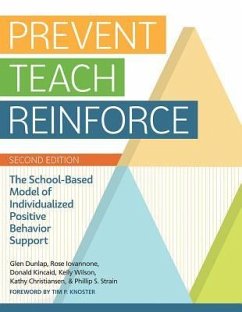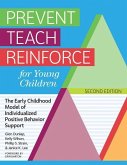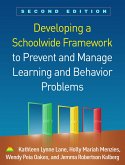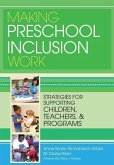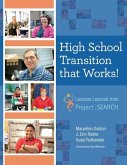Glen Dunlap, Rose Iovannone, Donald Kincaid, Kelly Wilson, Kathy Christiansen, Phillip S Strain
Prevent-Teach-Reinforce
The School-Based Model of Individualized Positive Behavior Support
Glen Dunlap, Rose Iovannone, Donald Kincaid, Kelly Wilson, Kathy Christiansen, Phillip S Strain
Prevent-Teach-Reinforce
The School-Based Model of Individualized Positive Behavior Support
- Broschiertes Buch
- Merkliste
- Auf die Merkliste
- Bewerten Bewerten
- Teilen
- Produkt teilen
- Produkterinnerung
- Produkterinnerung
An easy-to-use practical guide to the research-proven Prevent-Teach-Reinforce (PTR) model. This book helps K-8 educators solve serious behaviour challenges by guiding school-based teams through the five-step PTR process. This edition has been updated to include the latest research supporting PTR.
Andere Kunden interessierten sich auch für
![Prevent Teach Reinforce for Young Children Prevent Teach Reinforce for Young Children]() Glen DunlapPrevent Teach Reinforce for Young Children55,99 €
Glen DunlapPrevent Teach Reinforce for Young Children55,99 €![Developing a Schoolwide Framework to Prevent and Manage Learning and Behavior Problems Developing a Schoolwide Framework to Prevent and Manage Learning and Behavior Problems]() Kathleen Lynne LaneDeveloping a Schoolwide Framework to Prevent and Manage Learning and Behavior Problems48,99 €
Kathleen Lynne LaneDeveloping a Schoolwide Framework to Prevent and Manage Learning and Behavior Problems48,99 €![Making Preschool Inclusion Work Making Preschool Inclusion Work]() Anne Marie Richardson-GibbsMaking Preschool Inclusion Work48,99 €
Anne Marie Richardson-GibbsMaking Preschool Inclusion Work48,99 €![High School Transition That Works High School Transition That Works]() Maryellen DastonHigh School Transition That Works45,99 €
Maryellen DastonHigh School Transition That Works45,99 €![Teaching Young Children with Disabilities in Natural Environments Teaching Young Children with Disabilities in Natural Environments]() Mary Jo NoonanTeaching Young Children with Disabilities in Natural Environments72,99 €
Mary Jo NoonanTeaching Young Children with Disabilities in Natural Environments72,99 €![Self-Determination and Transition Planning Self-Determination and Transition Planning]() Karrie A ShogrenSelf-Determination and Transition Planning34,99 €
Karrie A ShogrenSelf-Determination and Transition Planning34,99 €![The Special Educator's Toolkit The Special Educator's Toolkit]() Cindy GoldenThe Special Educator's Toolkit50,99 €
Cindy GoldenThe Special Educator's Toolkit50,99 €-
-
-
An easy-to-use practical guide to the research-proven Prevent-Teach-Reinforce (PTR) model. This book helps K-8 educators solve serious behaviour challenges by guiding school-based teams through the five-step PTR process. This edition has been updated to include the latest research supporting PTR.
Hinweis: Dieser Artikel kann nur an eine deutsche Lieferadresse ausgeliefert werden.
Hinweis: Dieser Artikel kann nur an eine deutsche Lieferadresse ausgeliefert werden.
Produktdetails
- Produktdetails
- Verlag: Brookes Publishing Company
- 2nd edition
- Seitenzahl: 216
- Erscheinungstermin: 6. September 2018
- Englisch
- Abmessung: 262mm x 213mm x 10mm
- Gewicht: 499g
- ISBN-13: 9781681250847
- ISBN-10: 1681250845
- Artikelnr.: 52424689
- Herstellerkennzeichnung
- Libri GmbH
- Europaallee 1
- 36244 Bad Hersfeld
- gpsr@libri.de
- Verlag: Brookes Publishing Company
- 2nd edition
- Seitenzahl: 216
- Erscheinungstermin: 6. September 2018
- Englisch
- Abmessung: 262mm x 213mm x 10mm
- Gewicht: 499g
- ISBN-13: 9781681250847
- ISBN-10: 1681250845
- Artikelnr.: 52424689
- Herstellerkennzeichnung
- Libri GmbH
- Europaallee 1
- 36244 Bad Hersfeld
- gpsr@libri.de
Glen Dunlap, Ph.D., has been involved with individuals with disabilities for more than 45 years and has served as a teacher, administrator, researcher, and university faculty member. He has directed numerous research and training projects and has been awarded dozens of federal and state grants to pursue this work. He has authored more than 250 articles and book chapters, coÂ-edited numerous books, and served on 15 editorial boards. He was one of the founders of the Association for Positive Behavior Support, and served terms as treasurer and president of that organization. He is also the lead author on each of the books in the PTR series. Dr. Dunlap was a founding editor of the Journal of Positive Behavior Interventions and served for 10 years as the editor of Topics in Early Childhood Special Education. Dr. Dunlap lives in Reno, NV and is affiliated with the University of Nevada, Reno. Rose Iovannone, Ph.D., Assistant Professor, Division of Applied Research and Educational Support (DARES), Department of Child & Family Studies, Florida Mental Health Institute, University of South Florida, 13301 Bruce B. Downs Boulevard, MHC 2113A, Tampa, Florida 33612-3899 Dr. Iovannone is currently the director of the Prevent-Teach-Reinforce (PTR) Project. She has also served as the co-principal investigator on a University of South Florida (USF) subcontract for the Professional Development in Autism Project funded by Office of Special Education Programs (OSEP) and Assistant Director for the Center for Autism and Related Disabilities (CARD) at USF. She has published several journal articles and book chapters in the areas of functional assessment, function-based support plans, and positive behavior support and is currently working on numerous manuscripts related to preliminary outcomes of the PTR project. She teaches graduate-level courses on behavioral interventions. As an expert in providing support at the tertiary level, Dr. Iovannone is also a well-respected trainer and consultant. She has extensive experience in working with individuals with autism, learning disabilities, and emotional disabilities. Her principal activities and research interests have been in the areas of functional behavior assessment and positive behavior support, augmentative and alternative communication, and assessment and evaluation. Donald Kincaid, Ed.D., Assistant Program Director and Professor, Division of Applied Research and Educational Support (DARES), Department of Child & Family Studies, Florida Mental Health Institute, University of South Florida, 13301 Bruce B. Downs Boulevard, MHC 2113A, Tampa, Florida 33612-3899 Dr. Kincaid is the director of the Florida Positive Behavior Support Project and the Principal Investigator of the Prevent-Teach-Reinforce model. He is also a collaborator and principal investigator for the University of South Florida's subcontract with the Technical Assistance Center for Positive Behavioral Interventions and Supports. He also serves as the co-principal investigator on Florida's Center for Inclusive Communities, a University Center for Excellence in Developmental Disabilities. His primary interests are in applying positive behavior support approaches for individual students, classrooms, and entire schools. Much of his professional activity involves coordinating systems change efforts at a local, state, and national level to support the implementation of evidence-based practices. Dr. Kincaid also teaches at the university level and serves on a number of editorial and advisory boards in the area of positive behavior support. Kelly Wilson, M.A., is a trainer, consultant, and researcher currently working with the Pyramid Model Consortium and Brookes-On-Location. Ms. Wilson provides training and consultation in Early Childhood Education programs that includes administrators and leaders, program directors, staff, teachers, and families to support implementation of Pyramid Model, all Prevent-Teach-Reinforce (PTR) products and systems change. Previously, Ms. Wilson worked for the University of Colorado Denver for 13 years as a research assistant. She spent 5 years working on PTR research by supporting staff, teachers, and families with children with severe and persistent challenging behavior. She also worked as a consultant for Learning Experiences: An Alternative Program for Preschoolers and Parents (LEAP) Outreach Project, providing consultation in early childhood to preschools and elementary schools serving children with autism and challenging behaviors. Ms. Wilson has been involved in almost every aspect of early childhood with an emphasis on challenging behaviors and inclusive education. She is the mother of four extraordinary children who all have Fragile X Syndrome and has gained experience with challenging behavior at a personal and professional level. Kathy Christiansen joined Floridaâ (TM)s Positive Behavior Support Project in 2008 as a Technical Assistant Specialist. She provides consultation, training and technical assistance to school districts throughout the state of Florida on positive behavior supports across all three tiers. Prior to joining the project, Kathy served as a Behavior Research Specialist with the Prevent-Teach-Reinforce research project, a school-based model of individualized positive behavior support, funded through the Institute of Education Sciences, US Department of Education. Phillip Strain, Ph.D., is James C. Kennedy Endowed Chair in Urban Education at the Morgridge College of Education and Director of the Positive Early Learning Experiences Center at the University of Denver. Dr. Strain is the author of more than 300 professional papers that have focused on young children with autism, prevention of challenging behavior, and inclusion practices. In his 4 decades in the field, he has been a teacher, early intervention program administrator, and university professor. Dr. Strainâ (TM)s research on challenging behavior and autism has received more than $80 million dollars in grant support, and this work has garnered multiple career achievement awards. Tim Knoster, Ed.D., is a professor at the McDowell Institute for Teacher Excellence in Positive Behavior Support in the College of Education at Bloomsburg University of Pennsylvania. The McDowell Institute emphasizes the translation of research on multi-tiered systems of support--most specifically, positive behavior intervention and support--into practice in schools. Dr. Knoster has also served as Executive Director of the International Association for Positive Behavior Support since its inception in 2003. Dr. Knoster (or Tim, as he prefers) has been involved with preservice and in-service teacher training for more than 30 years. He has worn many hats throughout his career, including the role of an instructor of undergraduate and graduate courses, a classroom teacher in the public schools, Director of Student Support Services and Special Education, and Principal Investigator as well as Program Evaluator on federal projects focused on classroom and student-centered behavior intervention and support. Specifically relevant to this book, Dr. Knoster has extensive experience in providing professional development for classroom teachers and has been the recipient of numerous awards for his endeavors in this regard. He has extensively published and provided training for educators and staff from various child-serving systems in the application of positive behavior support in schools and community-based settings. Dr. Knoster has an uncanny ability to help teachers interpret the research literature on behavioral matters in a way that enables them to translate that same research into practical strategies and approaches in their classrooms.

